Of Laws, Not Men: A New England AAR
- Thread starter Jape
- Start date
-
We have updated our Community Code of Conduct. Please read through the new rules for the forum that are an integral part of Paradox Interactive’s User Agreement.
You are using an out of date browser. It may not display this or other websites correctly.
You should upgrade or use an alternative browser.
You should upgrade or use an alternative browser.
As a New Englander, I support this project of yours. The story is excellent and the writing superb. I can't wait to see the heights to which you bring my native region.
(Go Boston!)
(Go Boston!)
An economic boom is always helpful to a new nation. It'll be interesting to see how the aggressive anti-slavery policies manage to make enemies in the Union
Nathan Madien: Thank you. Personally I think the prologues are a little too light but I want to get onto the game proper. I might go back and flesh things out at some point.
germanpeon: Thank you, hopefully I'm up to the challenge, I'm but an old Englander so if you or any of your fellow Yankees have some nice regional details to throw my way I'd very much appreciate it.
Sandino: Oh yes its very prestigious. I'll try to avoid getting too silly but its built into NE as a decision so I'll try to keep it nice and light.
Omen: Its good to have you on board.
Estonianzulu: It is and really its just what happened in real life - the Industrial Revolution in America was overwhelmingly powered by water mills right into the 1860s, and New England has many powerful rivers. Actually the real terrible effect of secession is its basically robbed the USA of meaningful industry. In 1836 in-game the USA has *no* capitalists and a tenth of my industrial score!
The Secession's effect on abolition and the anti-slavery movement will be problematic in parts but also interesting in good and bad ways. But ah! I say too much.
alhoward: Glory indeed! I hope anyway. Changes have been limited to NE getting New York state, Messing about with some US events and making Dixie their primary culture, which included some pop conversions so they have a plurality. Also I've altered somethings in West Africa but I wont reveal anything just yet. Also I steered some things in-game at the very start for narrative purposes (NE starts with Caribou, so no Aroostook War for instance).
Right, first proper update in a bit hopefully.
germanpeon: Thank you, hopefully I'm up to the challenge, I'm but an old Englander so if you or any of your fellow Yankees have some nice regional details to throw my way I'd very much appreciate it.
Sandino: Oh yes its very prestigious. I'll try to avoid getting too silly but its built into NE as a decision so I'll try to keep it nice and light.
Omen: Its good to have you on board.
Estonianzulu: It is and really its just what happened in real life - the Industrial Revolution in America was overwhelmingly powered by water mills right into the 1860s, and New England has many powerful rivers. Actually the real terrible effect of secession is its basically robbed the USA of meaningful industry. In 1836 in-game the USA has *no* capitalists and a tenth of my industrial score!
The Secession's effect on abolition and the anti-slavery movement will be problematic in parts but also interesting in good and bad ways. But ah! I say too much.
alhoward: Glory indeed! I hope anyway. Changes have been limited to NE getting New York state, Messing about with some US events and making Dixie their primary culture, which included some pop conversions so they have a plurality. Also I've altered somethings in West Africa but I wont reveal anything just yet. Also I steered some things in-game at the very start for narrative purposes (NE starts with Caribou, so no Aroostook War for instance).
Right, first proper update in a bit hopefully.
IV: Federalist Folly; or the Burrian Heresy
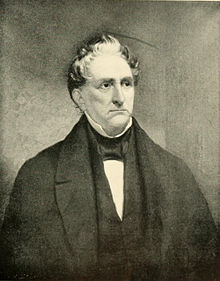
Henry Edwards, 5th President of the Commonwealth of New England
The June 1836 congressional elections proved that President Edwards victory two years previous had been more than a simple aberration. For the Federalists it was not only a monumental shift in Commonwealth politics, but arguably an embarrassingly avoidable one. While the 1820s had seen minor opposition groups like the Patriots and Yeomen Party rise from the ashes of the Democratic-Republicans in New England, the majority that had remained politically active had, led by Aaron Burr, wisely taken up the secessionist cause and absorbed themselves into the Federalist fold.
The Burrian faction had soon come to dominate the Party in New York. However deemed junior to the ‘Lords Ascendant’ as the aged oligarchs of the Party were mockingly known, they were increasingly side-lined despite their electoral strength. In 1828, when Burr himself was passed over for the presidency in favour of Rhode Islander William Hunter, a political civil war had resulted. The Burrians fought the True Federalists at the polls, and despite failing to carry a single state (New York proved dishearteningly close), won over 30% of the national vote. Striking a chord with artisans and farmers tired of the complacent and aristocratic Federalists, the elderly Burr passed the torch onto his fellow New Yorker and political machine maestro Martin Van Buren, who set about forging an alternative. By 1834, a motley coalition of Burrian Federalists, Patriots, and populists had coalesced to form the Republican Party.
The independent Governor of Connecticut, Henry Edwards had been chosen as their candidate for his broad appeal while Van Buren guided the campaign. Levi Lincoln, arrogantly confident of a coronation, became the first Federalist presidential candidate to lose at the polls. However it took 1836, and the loss of the Federalist majority in the House of Representatives, before the Party accepted its hegemony was at its end. Though still dominant in the Senate, it lacked a two-thirds majority and watched helplessly as Edwards dismantled the high tariff walls that had long, in the words of the President, “harboured the mill owner and hindered the shopkeeper”.
Federalist 63
Republican 59
Independent 16
House Total 138
Federalist 12
Republican 7
Independent 2
Senate Total 21[1]
Apocalyptic fears of economic ruin proved somewhat premature however. Though still young, New England’s industry had grown in leaps and bounds since the turn of the century. Steel, lumber and textiles flowed from her mills across the globe. Though trade had been slowly picking up since the end of the 1830 slump, free trade brought an influx of cheap goods like cotton, iron and tobacco, leading to a boom in new industry and luxury goods for all but the worst off. By 1840 for every sizeable factory operating in the United States, the Commonwealth could boast ten. Indeed across British North America and the newly free Latin republics to the south, the gap was only wider.

Lithograph of Sawyer Woolen Mill in Dover, New Hampshire
The Republicans also made an effort to clear the cobwebs of almost a quarter century of one party rule. Dozens of committees were established to overlook countless judicial and administrative appointments, the vast majority handed out as political favours. While the spoils system was hardly abolished (Judge Levi Woodbury mocked the reform committees a ‘day at market’), hundreds of federal employees who were found to be duplicating work, effectively retired with their position a political pension or had gained their position overtly through family, were soon reassigned or fired, leading to a notable increase in efficiency.
Edwards’ term was primarily one of stability and growth. As civil wars tore through Peru, Brazil and Central America, and the United States grappled with Mexico for control of Texas, New England was an American island of peace and prosperity. The Republicans were rewarded with a small majority in the 1838 House elections and plans were underway for a great national exhibition of science and industry in Providence the following year.
Soon however, the President’s fortunes suffered. As part of the Republican programme of economic liberalism, restrictions had been loosened on the practice of free banking. Though the central Bank of New England remained in place, the late 1830s saw a surge of small provincial institutions, minting currency and invested in by local entrepreneurs. In July 1838, as Martin Van Buren returned from the coronation of Queen Victoria, a financial scandal broke.
Vladimir Sturmer, a merchant purporting to be a agent of the Tsar, had taken out huge loans from several Massachusetts banks the previous year in order to purchase munitions from Springfield Armoury for the Russian Army. However it quickly became apparent via the Minister to Boston that Sturmer lacked any authority from St. Petersburg. The Minister confirmed the Tsar had no such request and the deal quickly collapsed. Now wanted for fraud, the Russian successfully absconded to Europe with over $100,000, causing several of the lending banks to collapse and leaving Springfield Armoury without payment.
While the Sturmer Scandal hurt the Republicans and the policy of free banking (and a brief bout of anti-Russian sentiment), the Bank of New England soon suffered a financial crisis of its own. Following his defeat in the Mexican-American War in 1838, Santa Anna had sought to strengthen his position via lavish projects, bribes and a successful military adventure. All required money however and Boston[2] was willing to lend. The following year, the ’Napoleon of the West’ invaded newly independent Guatemala over the disputed Chiapas, expecting a swift conclusion.
However, the jungles and hills of Chiapas proved a quagmire for the Mexican army, sucking in men and material, eventually requiring over 40,000 men before the small republic conceded the province in February 1840. The pyrrhic victory did not provide the glory Santa Anna coveted. A year of bloody war, and the dictator absent from Mexico City, only destabilised the country further. Soon liberals in the north and separatists in Yucatan rose in revolt. By now, the New England loans had ballooned to over $600,000 and the Mexican treasury struggled even to pay Boston’s high interest rates. Desperate, and focused on stamping out dissent, Santa Anna wrote off the debt, confident New England could do little to respond. Not for the first time, the Mexican dictator had somewhat miscalculated.
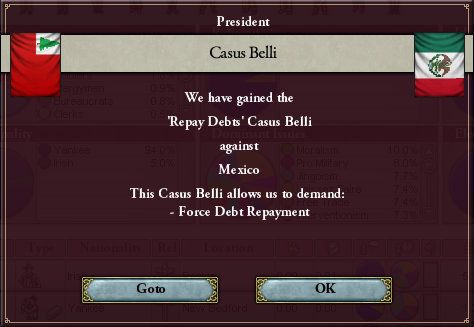
[1] Due in part to the six year election cycle and in part to ‘better represent’ the people, both Houses were increased by a third in 1816. So three senators per state for instance.
[2] The central bank was the main lender, however dozens of domestic and international trading houses all ended up contributing to the mammoth loan
Last edited:
Didn't take too long for that bastion of peace to get its feet dirty. Nothing like a good old fashioned war fought over nothing but money 
I was about to say Mexico is going to get curb stomped but then I remembered you're not the USA :laugh:
What's New England's army like?
What's New England's army like?
Burr lost the election  Two questions: was Guatemala added in (release from USCA), and does Texas exist independently?
Two questions: was Guatemala added in (release from USCA), and does Texas exist independently?
Estonianzulu: Indeed. I have to admit several play-throughs of Vicky 2 as a 'creditor' nation has made me groan every time someone defaults on my loans. Particularly as landlocked German minors seem to be the usual culprits. Either that or its a Great Power (Russia is the usual suspect) that I have no chance of defeating in a war. Still in cases like this it has some juicy RP potential.
ve3609: Cheers
Sandino: In 1840? Not great. However the various Jacobin risings, not to mention two secessionist movements (Rio Grande and Yucatan) helped to level the playing field somewhat.
alhoward: Well he is the man who killed Hamilton so his personal love in New England was never going to be great. Add in the ad hoc setup for his election run and its not terribly surprising.
On your questions: The USCA imploded quite suddenly around 1839. It seemed to weather the initial secessionist rebellions quite well but then El Salvador suddenly broke away (I have to admit not paying much attention to the region at the time) and the rest followed. The USA allied to Texas in 1836, seized the South-West from Mexico and then absorbed Texas, so no its no longer independent.
-----
Right I'll get the next update up later today. I have to admit I expected more of a response for the first 'real' update but hey-ho, thanks for following.
Jape
ve3609: Cheers
Sandino: In 1840? Not great. However the various Jacobin risings, not to mention two secessionist movements (Rio Grande and Yucatan) helped to level the playing field somewhat.
alhoward: Well he is the man who killed Hamilton so his personal love in New England was never going to be great. Add in the ad hoc setup for his election run and its not terribly surprising.
On your questions: The USCA imploded quite suddenly around 1839. It seemed to weather the initial secessionist rebellions quite well but then El Salvador suddenly broke away (I have to admit not paying much attention to the region at the time) and the rest followed. The USA allied to Texas in 1836, seized the South-West from Mexico and then absorbed Texas, so no its no longer independent.
-----
Right I'll get the next update up later today. I have to admit I expected more of a response for the first 'real' update but hey-ho, thanks for following.
Jape
I have to admit I expected more of a response for the first 'real' update but hey-ho, thanks for following.
Jape
I'm proud of you....
V: The Mexican Expedition
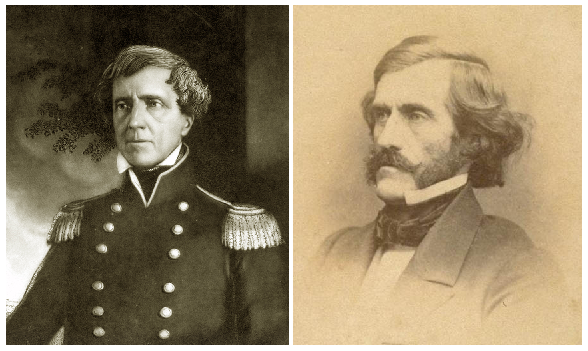
Colonel Joshua Wade & Commodore Donald Ewing

Colonel Joshua Wade & Commodore Donald Ewing
The Mexican Loans Crisis couldn’t have come at a worse time for the Republicans. While Congress, the press and general public where united in their outrage, President Edwards dithered in his response. Well aware of New England’s weak military position, he proved unwilling to organise a punitive expedition thousands of miles across the continent to face Santa Anna. Indeed it was a logical conclusion, as despite the disastrous results of the Texan War, the Mexican army was still a large and experienced force compared to what the Commonwealth could muster at the time. There was also the motivation of posterity. With the 1840 presidential campaign already underway, Edwards didn’t wish to end his mostly successful 6 year term with a risky military adventure.
For the Federalists, the crisis was fortuitous. While the Republican candidate, Charles E. Dudley of New York, was forceful in his calls for action against Mexico, he was under strong pressure from Martin Van Buren and the rest of Bucktail faction in Albany not to attack Edwards’ inaction. Still young, the leadership were fearful of a Party split between New York and the smaller states, such as the President’s home state of Connecticut. His opponent, Senator Daniel Webster, had no such qualms. An unreformed Hamiltonian from Massachusetts known for his temper, Webster was arguably the personification of what had caused the Burrian Heresy and lost the 1834 election. However he was also a fierce nationalist and powerful orator and it was his polemics in the (still Federalist dominated) press and the last Congressional sessions that caught the national mood.
When the issue of the Commonwealth Navy’s inability to transport a substantial expedition to Mexico was raised Webster simply demanded the ships be built and the men be raised. He called for private and even foreign schooners and merchantmen to be drafted into service. As jingoism swept the country, thousands of men applied to the army and navy. Combined with promises to strengthen the central bank, the simple message to right the wrongs of Edwards’ presidency proved popular. Even as the President agreed to military action in May, the Republican campaign seemed moribund. Hindered from attacking Edwards, Dudley merely presented the economic successes of the previous decade, which Webster mocked as “taking praise for another man’s work”. Added to this Webster’s running mate, the New Yorker Nathaniel P. Tallmadge, a long time rival of Dudley, proved a fierce opponent in their home state, while his Republican opposite, John Dana of Maine, was all but an electoral nonentity.
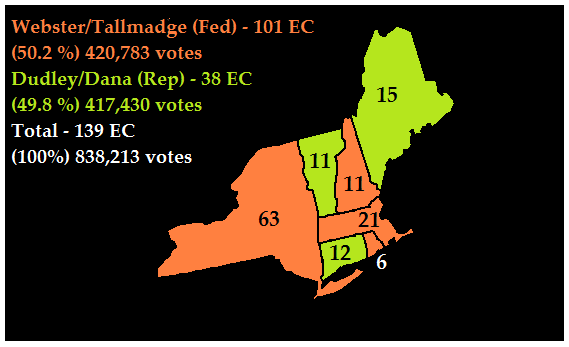
1840 New England Presidential Election Results
Despite the patriotic groundswell that accompanied Webster, his victory was surprisingly close. New York’s decisive 63 electoral votes fell to the Federalists by only three thousand votes, while in Congress, the Republicans held on to their House majority. Regardless, in the eyes of President-elect Daniel Webster, he now had a ringing national endorsement to punish Santa Anna. Accepting his successor’s intent, Edwards worked with Webster towards organising an expeditionary force. A miscellaneous squadron of frigates and private shipping under the command of Commodore Donald Ewing set out in early September, just a week after Webster’s inauguration, bound for Veracruz. Arriving on the 22nd, they met little resistance. Colonel Joshua Wade (brevetted Brigadier-General) led the 4,000 strong expedition ashore, a collection of army veterans, marines and state guardsmen.
Expecting a battle, Wade and Ewing were surprised to discover the local garrison, led by the mayor, had recently left Veracruz to join liberal rebels to the north. The city was staunchly opposed to Santa Anna, and as such left the New Englanders in a quandary. They had expected seizure of the port to be enough to force Mexican acceptance of repayment. However the dictator all but ignored the small landing, far more concerned with secessionist forces in Rio Grande and the Yucatan. Wade’s brigade remained in Veracruz into October, unsure how to act. Back home there was discontent with what the Republican press was calling Webster’s tropical holiday. Upset by the lack of progress, the President sent word for Wade to march on Mexico City and ‘seize [Santa Anna’s] gold from the vault’ if necessary. Uncertain about sending his small force deep into hostile territory with little knowledge of the enemy’s location, Wade nonetheless consented and set off into the Mexican interior.
The New Englanders met no organised resistance on the road to the capital. Mexico was in chaos, with government and rebel forces, Indians and secessionists, bandits and peasants, all up in arms, fighting for their share of the crumbling nation. When Wade arrived outside Mexico City in late November, he encountered a disorganised collection of loyalist troops and local militia. However without any effective leadership, the already demoralised defenders were easily pushed aside with a short cannonade. Indeed, the expedition’s most difficult task quickly became the occupation of the city. Only 4,000 strong, Wade was rightly worried that nationalist anger might trigger an uprising from the populace, one the brigade would be hard pressed to suppress.
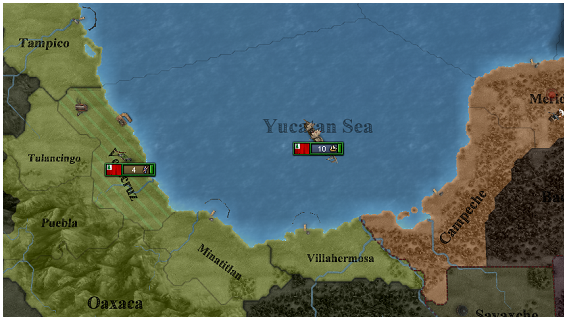
The landing at Veracruz, September 1840
Luckily the fall of his capital and administrative hub produced a much more immediate response from Santa Anna. Indeed by December, thanks to several border incidents, President Calhoun had ordered U.S. intervention into Mexico, presenting Santa Anna with a much more threatening foreign enemy. On New Years Day 1841, the last battle of New England’s Mexican expedition took place off the coast near Tampico. There, Commodore Ewing, and several U.S. warships decisively defeated a desperate sortie by Rear Admiral Pedraza, leaving the entire Mexican Gulf coast open to attack. The next day, the Mexican dictator’s representatives signed a treaty of compensation with General Wade, and the New Englanders marched off back to Veracruz, carrying with them the lion’s share of Mexico’s meagre gold reserves.
The expedition sailed into Boston harbour on 21st January to massive fanfare from the gathered crowds, led by President Webster. Wade was officially promoted to Brigadier-General, while Obed Marsh, captain of the privateer schooner which seized Pedraza’s flagship at Tampico, became the first recipient of the Cross of Valour. Meanwhile, Mexican upheaval would continue well into the future. Supported by U.S. arms, the liberal rebels would finally win the civil war in 1843, forcing Santa Anna into exile in Cuba. The Yucatan Republic, the most determined of the secessionists movements would survive into 1846 before being crushed by the central government, its resistance ironically aided in no small part by New England bankers. In the Commonwealth, the upheaval was seen as a successful adventure, helping to stamp the nation’s position as a rising American power. Little did Webster know however, that it was to prove the high water mark of an increasingly controversial presidency.
Last edited:
Excellent update.
Had me glued to the screen from start to finish, and left me drooling for more with the promise of controversy for Webster.
I wonder, will it be a scandal or just a nasty piece of legislation?
Had me glued to the screen from start to finish, and left me drooling for more with the promise of controversy for Webster.
I wonder, will it be a scandal or just a nasty piece of legislation?
Good read.
By the way, how did you figure out the numbers for the 1840 New England Presidential Election Results?
By the way, how did you figure out the numbers for the 1840 New England Presidential Election Results?
Without some demographical changes, seems like New York is going to pretty much be the dominator in New English politics. Whoever wins there needs to carry only one other state that isn't Rhode Island. Who ever looses New York would have to carry every other state, except Rhode Island. So Rhode Island might also end up very neglected since its impossible for it to swing an election. 
The solution is, of course, to expand into Canada.Without some demographical changes, seems like New York is going to pretty much be the dominator in New English politics. Whoever wins there needs to carry only one other state that isn't Rhode Island. Who ever looses New York would have to carry every other state, except Rhode Island. So Rhode Island might also end up very neglected since its impossible for it to swing an election.
Lucky for you Mexico was a basketcase when you turned up. When are you going to pick on someone your own size?

